|
|
|
Sort Order |
|
|
|
Items / Page
|
|
|
|
|
|
|
| Srl | Item |
| 1 |
ID:
079982
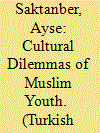

|
|
|
|
|
| Publication |
2007.
|
| Summary/Abstract |
The ways in which the identity of Islamist youth has shifted from the collective to the individual via a process of self-reflexivity within Turkey's changing political and cultural social context encompass different expressions of the cultural dilemmas faced by Muslim youth. Through looking at textual and audiovisual autobiographical literary and factual accounts, this essay reflects upon the modalities of the particular transformation of well educated Muslim youth. It argues that such an exploration is an investment in a way to understand the problems of future generations of youth, which will be constantly open to new cultural dilemmas
|
|
|
|
|
|
|
|
|
|
|
|
|
|
|
|
| 2 |
ID:
133304
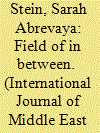

|
|
|
|
|
| Publication |
2014.
|
| Summary/Abstract |
In the spring of 1902, Miryam bint Lalu Partush appealed to military representatives in Ghardaïa, in the Mzab Valley (a valley of five fortified oasis cities in the northern Algerian Sahara, six hundred kilometers south of Algiers), for the paperwork that would allow her to undertake a six-month pilgrimage to Jerusalem with her husband, the wealthy merchant Musa (Moshe) bin Ibrahim Partush. Miryam Partush was unusual in possessing the means for such a rare, costly voyage; but notwithstanding her class, Partush's legal status was typical of most Muslims and southern Algerian Jews in Algeria. She was not a citizen, nor did she hold official papers of any kind. When Miryam Partush appealed to the military authorities in Ghardaïa, then, she was appealing for many things: for the right to leave her native valley and travel to the port of Algiers; for the papers that would allow her to cross colonial boundaries; and for the documentation that would register her liminal legal identity. Authorizing her travel, Algeria's governor-general named Partush a "non-naturalized Jew from the Mzab." Thus did Partush embark on her six-month journey with a negative legal identity: this Jewish woman was definable, in the eyes of the law, only by what she did not possess.
|
|
|
|
|
|
|
|
|
|
|
|
|
|
|
|
| 3 |
ID:
078923
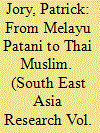

|
|
|
|
|
| Publication |
2007.
|
| Summary/Abstract |
This paper is a study of how the people at the centre of the violent conflict in Thailand's southern border provinces have been represented, with particular reference to the period from the Second World War to the present. It provides a brief historical background to a number of discourses of identity regarding the people in the region. It focuses on the struggle between competing discourses of Thai national identity, Malay ethnic identity, Muslim identity, and a more localized identity centred on the memory of the former sultanate of Patani and its associated linguistic and cultural traditions
|
|
|
|
|
|
|
|
|
|
|
|
|
|
|
|
| 4 |
ID:
188977


|
|
|
|
|
| Summary/Abstract |
This article examines the depiction and construction of Muslim identity in Indonesian cinematic discourse. We conducted a close reading of our case study, which is Nurman Hakim’s Islamicate film trilogy about Indonesian Muslims: 3 Doa 3 Cinta (2008), Khalifah (2011), and Bid'ah Cinta (2017). Consistently exploring the theme of moderate Muslim identity in the age of global terrorism, the films shed light on the development of Indonesian Muslim self-representation over a decade (2008–2017). The goal of discourse analysis is to assess how narrative and stylistic elements in films are used to construct a moderate Muslim identity. Our findings indicate a shift in the identity discourse between the first and subsequent films. While the first film attempts to construct a moderate Muslim identity as a reaction to illiberal Islamophobia, the second and third films move toward articulating liberal Islamophobia. We argue that this dynamic of representational politics reflects contemporary Indonesia’s shifting political discourse on moderate Islam.
|
|
|
|
|
|
|
|
|
|
|
|
|
|
|
|
| 5 |
ID:
107886
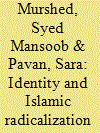

|
|
|
|
|
| Publication |
2011.
|
| Summary/Abstract |
This article argues that both socio-economic disadvantage and political factors, such as foreign policy of the West about the Muslim world, along with historical grievances, play a part in the development of Islamic radicalized collective action in Western Europe. We emphasize the role of group identity-based individual behaviour in organizing collective action within radicalized Muslim groups. Inasmuch as culture plays any role at all in radicalization, it is because individuals feel the imperative to act on the basis of their Muslim identity, something to which different individuals will attach varying degrees of salience, depending on how they place their Muslim identity-based actions in the scheme of their multiple identities. We also emphasize the role of the opportunistic politician, from the majority European community, in fomenting hatred for Muslims, which also produces a backlash from radicalized political Islam. We present comparative evidence of socio-economic, political and cultural disadvantage faced by Muslim minorities in five West European countries: Germany, the UK, France, Spain and the Netherlands.
|
|
|
|
|
|
|
|
|
|
|
|
|
|
|
|
| 6 |
ID:
139178
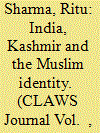

|
|
|
|
|
| Summary/Abstract |
Territory has always played a pivotal role in inter-state rivalry. John A Vasquez has said that the value of territories increases due to their strategic locations, such as if they provide access to the sea or are a source of water. But territories acquire another important dimension if they are home to ethnic and religious communities that form part of the neighbouring state.1 The state of Kashmir presents one such enduring conflict where the separatist demands in the state of Jammu and Kashmir (J&K), coupled with the irredentist claim of Pakistan, have helped in shaping a narrative in India. The popular assumption in India is that ‘Muslim separatism’ got manifested in the form of the country’s partition in 1947 and the prevalent contention is that Muslims had a choice of political identity but they chose one based on religion.2 This has resulted in an unintended linking of the Kashmiris’ demand for greater autonomy or a separate state with the identity of Muslims in the rest of India.
|
|
|
|
|
|
|
|
|
|
|
|
|
|
|
|
| 7 |
ID:
062618
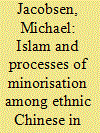

|
|
|
| 8 |
ID:
105309


|
|
|
| 9 |
ID:
121449
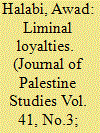

|
|
|
|
|
| Publication |
2012.
|
| Summary/Abstract |
The imposition of British rule in Palestine following World War I did not immediately supplant one imperial system with another or Ottoman identities with national ones. Examining Palestinian responses to the Turkish war of independence, this article argues that the 1917-22 period should be seen as a "liminal" era suspended between imperial systems. Both Kemalists and Palestinians employed a discourse of loyalty to the Ottoman dynasty, Muslim identity, and resistance to European rule to frame their goals. It was only after the creation of the Turkish Republic and the promulgation of the British Mandate, the author argues, that nationalist identities displaced Ottoman ones for both Turks and Palestinians.
|
|
|
|
|
|
|
|
|
|
|
|
|
|
|
|
| 10 |
ID:
108397
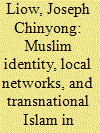

|
|
|
|
|
| Publication |
2011.
|
| Summary/Abstract |
This paper discusses the nature of local permutations of transnational Muslim networks in Thailand's southern Muslim-majority provinces and assesses their impact on creed, custom, and conflict in the region. More specifically, the paper interrogates the agenda and methods of idea and norm-propagation on the part of these agents and networks, and their evolving role, as well as the structures and conduits through which they operate and mobilize. In so doing, it finds a tremendously fluid and dynamic terrain in southern Thailand, where narratives, representations, and expressions of Islamic doctrine, legitimacy, and authority, are increasingly heavily contested within the Muslim community as a whole. In addition, the paper investigates the transnational dimensions of on-going violence in the southern provinces. Here, it argues that there is little by way of substantive evidence of any sustained penetration of the conflict in southern Thailand by external actors. No doubt, many have attempted to draw conclusions to the contrary, but their evidence and arguments, not to mention analytical methodology, are tenuous at best.
|
|
|
|
|
|
|
|
|
|
|
|
|
|
|
|
| 11 |
ID:
140292
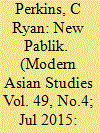

|
|
|
|
|
| Summary/Abstract |
In the second half of the nineteenth century an increasing number of Indians entered the world of volunteerism and public activism. One such individual was the prolific Urdu writer Abdul Halim Sharar (1860–1926), who served as the secretary for a short-lived voluntary association, the Anjuman-e Dar-us-Salam, during the late 1880s in Lucknow, India. Using readers’ letters as printed in Sharar's widely circulating monthly periodical, Dil Gudāz, this article seeks to understand the reasons behind the increasing role of volunteerism as part and parcel of a modern sharīf Muslim identity in the post-1857 period. Having adopted the role of a community activist, Sharar began using his periodical, soon after its inception, to mobilize and recruit his readers to participate in what he described as a passionate movement sweeping through the ‘Islami pablik’. Both rhetorical and descriptive, such an idea provided hope for a divided and struggling community to overcome the divisions that were central to their many challenges in a post-1857 world. Through the study of the vicissitudes and challenges faced by Sharar and his fellow activists, this article underscores the ways in which public activism and volunteerism simultaneously represented the possibility for Muslims to use their own resources to bring about real social and political change, and also reminded them of their shortcomings and the limits of an informal activism. This article seeks to show that ultimately, even such ‘failed’ and ephemeral attempts were foundational for more effective mass mobilization efforts in the following decades and into the twentieth century.
|
|
|
|
|
|
|
|
|
|
|
|
|
|
|
|
| 12 |
ID:
081378
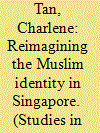

|
|
|
|
|
| Publication |
2008.
|
| Summary/Abstract |
This paper discusses how the Singapore government attempted to (re)imagine the Muslim identity in Singapore based on the crisis of the Jemaah Islamiah (JI) arrests in 2002. The paper argues that the government sought to resolve and manage the crisis using the combined apparatuses of the mass media, education and administrative regulations. The paper further analyses the constraints and challenges faced by the government in the process of (re)constructing and sustaining the Singapore Muslim identity. The attempt by the Singapore government provides a useful example of how the government of a multi-ethnic, multi-religious and multi-lingual country has responded to internal terrorist threats by (re)imagining the Muslim identity, and the problems and controversies such a (re)imaging process generates
|
|
|
|
|
|
|
|
|
|
|
|
|
|
|
|
| 13 |
ID:
116432
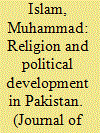

|
|
|
| 14 |
ID:
132967
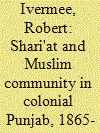

|
|
|
|
|
| Publication |
2014.
|
| Summary/Abstract |
This paper argues that concerns for the government appointment of qazis, officers for the administration of Muslim law, and the greater application of shari'at critically shaped Muslim community formation in later nineteenth century Punjab. Between 1865 and 1885, Punjabi Muslim elites attested the necessity of qazis being appointed by government and Muslim law being administered in the colonial judicial system. With the support of Gottlieb Leitner, registrar of the Punjab University College, Muslim parties used the emergent associations of Punjab civil society, including the Anjuman-i-Punjab (Lahore) and Anjuman-i-Islam (Lahore), to assert the indispensability of religious law. In doing so, they challenged the Anglo-Indian decision to prioritize customary law in the Punjab and advanced the religious group as the basic social unit of Punjab society. In Punjab public spaces, the relevance of Islam was proclaimed, challenging the professed Anglo-Indian distinction between private and public, religious and secular spheres. However, demands for qazi appointment and the administration of shari'at problematize well-rehearsed arguments about the relationships between family, community, state and religion in colonial Punjab. Only through an enquiry into the two decades after 1865 may later political campaigns for the application of shari'at be understood.
|
|
|
|
|
|
|
|
|
|
|
|
|
|
|
|
| 15 |
ID:
068884
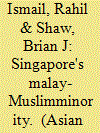

|
|
|
| 16 |
ID:
076011
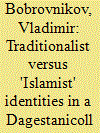

|
|
|
| 17 |
ID:
105008
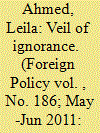

|
|
|
|
|
|
|
|